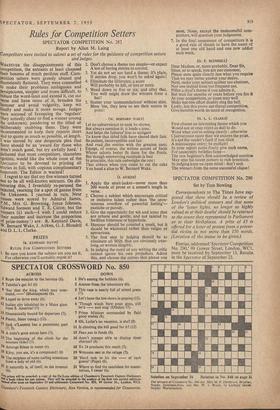Rules for Competition Setters
Competitors were invited to submit a set of rules for the guidance of competition setters and judges.
WHATEviza the disappointments of this tompetition, the entrants at least cleansed their bosoms of much perilous stuff. Com- Petition setters were grossly abused and Shamelessly flattered. They were counselled to make their problems ambiguous and Persipicuous, simpler and more difficult, to teduce the word-limit and extend it, cut out verse and have more of it, broaden the humour and avoid vulgarity, keep wit kindly and make it more savage. Judges Were accused of favouring the 'regulars' (they actually cheer to find a winner among he unknown), pandering to the titled or deliberately snubbing them. They were recommended to keep their reports short and to quote as much as possible, at length. I was moved by one desperate plea that there should be an 'award for those who aren't much good, but try awfully hard.' I gathered that most competitors, shameless egotists, would like the whole issue of the spectator to be devoted to printing all entries in full, with copious complimentary comment. The Editor is warned !
I regret to say that my five winners turned out to be all well-known entrants. On dis- covering this, I feverishly re-perused the rejected, yearning for a spot of genius from he Unknown. I yearned in vain. Near Trusses were scored by Admiral James, Mrs. G. Browning, Joyce Johnson, 'Award Samson and T. E. Caton; but the vmners (£1 each-I wish I could reduce their number and increase the proportion Of prize-money !) are : R. Kennard Davis, N. Bernard Wake, J. Aitken, G. J. Blundell Ind D. L. L. Clarke.
PRIZES (R. KENNARD DAVIS)
RULES FOR COMPETITION SETTERS l• Be sure you know the subject ere you set it.
For otherwise you'll certainly regret it 1
2. Don't choose a theme too simple-or expect A ton of boring entries to correct.
3. Yet do not set too hard a theme; it's plain, If entries drop, you won't be asked again !
4. Eliminate the illiterates; a score Will probably be left, or less or more.
5. Weed down to five or six; and after that, You well might draw the winners from a hat!
5. Scatter your 'commendations' without stint. Bless 'em, they love to see their names in print!
- (W. BERNARD WAKE) Let no subservience to rank be shown, But always mention it; it lends a tone,
And helps the failures' loss to mitigate To know that titled folk have shared their fate. Be patient, incorruptible and fair
And read , the entries with the greatest care; Except, of course, the witless scrawl of fools Whose talents better fit them for the Pools. But though unswerving rectitude is best
In principle, this rule outweighs the rest : That always when you come to cut the cake You hand a slice to W. Bernard Wake.
(J. AITKEN) 1. Apply the strait-jacket-never more than 200 words of prose or a sonnet's length in
Verse.
2. Choose a subject which encourages critical or imitative talent rather than 'the spon- taneous overflow of powerful feeling'- pastiche or parody.
3. Give the opportunity for wit and irony that are urbane and gentle, and not tainted by Swiftian bitterness or hyperbole.
4. Humour should be counted a merit, but it should be whimsical rather than vulgar or uproarious.
5. The first step in judging should be to eliminate all MSS. that are obviously over- long, or written illegibly.
6. In judging the merit of any writing the critic cannot ignore his own prejudices. Admit this, and choose the entries that p ease you most. None, except the unsuccessful com- petitors, will question your judgement.
7. In the final assessment of competitors it is a good rule of thumb to have the name of at least one old hand and one new addict each week.
(G. T. BLUNDELL) Dear Madam, or, more probably, Dear Sir, Since, so to speak, you are our customer, Please state quite clearly just what you require That we may better answer your desire. Next, make your subject neither too abstruse, Nor one insipid from too frequent use. Pilfer a rival's theme if you admire it, But wait for months or years before you fire it At your competitors, or some may well Make but one effort doubly ring the bell. Lastly, lest this prove cut-throat competition, Give humble worth its meed of recognition.
(D. L. L. CLARKE) First choose an interesting theme which you Would not at once reject as dull to do. Word what you're setting clearly : otherwise Clairvoyance more than wit secures the prize. It's not the reader's fault if you elicit A microscopic entry; be explicit! In your report notes freely give each name, For anonymity belittles fame- The raw beginner's first acknowledged mention May spur his latent powers to rich invention. In judging keep an open mind : don't seek The winners from the same successful clique!


































 Previous page
Previous page